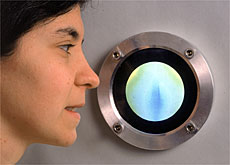Swiss regain upper hand in time measurement

A new atomic clock developed by scientists in Neuchâtel could bring Switzerland back to the forefront of time measurement.
The unique timepiece measures seconds with extreme precision using lasers and is so accurate it will gain or lose no more than a second every 30 million years.
Its creators – a group of physicists at Neuchâtel’s cantonal observatory – say the clock will act as a reference point for measuring international time and play a crucial role in satellite positioning and particle research.
The new timepiece was built in conjunction with the Swiss National Science Foundation. It is due to be handed over to the Federal Office of Metrology and Accreditation (Metas) at the end of March.
Gregor Dudle of the Metas time and frequency lab said the atomic clock was important for Switzerland and for international time measurement and would be used to calibrate other timepieces.
Extremely accurate
“It is quite an important thing in the sense that Switzerland has a long tradition in clock making and we’re trying to build on that,” he told swissinfo.
“The purpose of our clock will be to increase the contribution of Switzerland to the international timescale.”
“The clock has an accuracy which is far beyond what a wristwatch can produce.”
The Swiss invention belongs to a new generation of timepieces operating on the principle of laser atom cooling. Atoms of Cesium-133 are decelerated, or cooled, using a laser.
The atoms are then shot into a magnetic field, where they begin to oscillate rapidly.
“In a mechanical clock you have a pendulum which oscillates and that is used to divide time into equal intervals,” project leader Pierre Thomann told swissinfo.
“The principle in an atomic clock is very similar. It’s just that we replaced the mechanical pendulum by oscillations that take place inside atoms,” he explained.
The new generation clocks are around ten times more precise than the atomic clocks used up until now. Three are already in operation – in the USA, France and Germany.
Unique
But the Swiss device is unique in that it shoots atoms in a continuous rather than a spasmodic beam, which Thomann says leads to a greater concentration of atoms and makes for a more precise measurement.
The extreme accuracy of the Swiss clock means that it could be used in areas where absolute precision is needed, such as the planned European global navigation system, Galileo.
“The performance of the whole system depends very strongly on the quality of the clocks,” Thomann said, adding that the search would go on for the ultimate time measuring device.
“The next generation of atomic clock is already on its way… so there’s no end in sight really.”
swissinfo, Morven McLean
The new clock is ten times more precise than the previous generation of atomic clock.
It is accurate to within a trillionth of a second.
It will be used to calibrate other timepieces and set international time.
Only three other similar clocks exist in the world.
Because of its extreme precision, the clock is likely to be used in satellite navigation systems.

In compliance with the JTI standards
More: SWI swissinfo.ch certified by the Journalism Trust Initiative
You can find an overview of ongoing debates with our journalists here. Please join us!
If you want to start a conversation about a topic raised in this article or want to report factual errors, email us at english@swissinfo.ch.